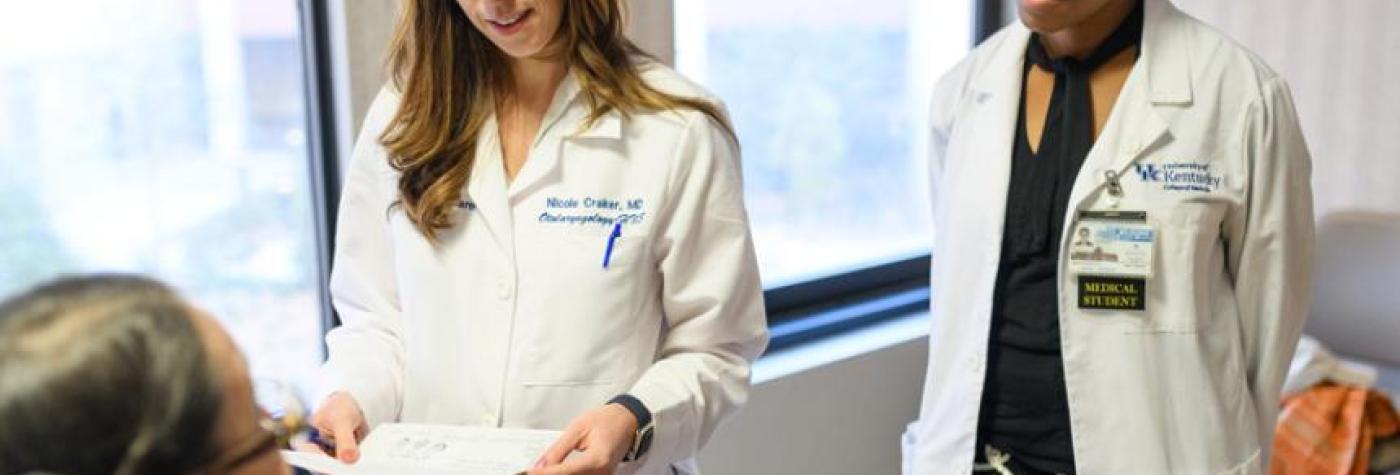If your health care provider believes you may have salivary gland cancer, you will need to be tested to be sure. During your test, you should expect to be asked questions about your health history, your symptoms, risk factors and family history of disease. Understanding your background helps your provider make a diagnosis.
Your provider will perform a physical examination of your head, neck, lymph nodes and inside your mouth.
We use a variety of tests to diagnose and determine the extent of salivary gland tumors. Tests we use include:
- CT scan, also called computed tomography scan, uses an advanced X-ray and computer to take pictures of the head in cross-sections to visualize the salivary glands and surrounding tissue. Radiation is used in this noninvasive imaging study.
- MRI, also called magnetic resonance imaging, is a noninvasive imaging study that does not use radiation but uses a magnetic field to take pictures of the head in cross-sections to visualize the salivary glands and surrounding tissues.
- PET scan, also called positron emission tomography scan, is a noninvasive imaging study in which a radioactive tracer is injected through an IV to help evaluate the metabolic activity in your tissues prior to imaging, to help detect cancer. PET scans may be used if biopsy results show a cancerous salivary gland tumor. PET scans can help identify whether the cancer is localized or if it has spread to other parts of the body.
- A fine needle aspiration is a type of biopsy that uses a needle to remove tissue or cells from the salivary gland to be checked by a pathologist under a microscope. Results from a biopsy help differentiate between cancerous and noncancerous cells.
- A salivary gland biopsy is done with local anesthesia, which uses medicine to numb the area (cheek, under the chin or under the tongue) where a needle will be inserted.
A biopsy may be performed with imaging guidance. Ask your provider about your specific type of biopsy to learn more.
Patients will be contacted after a biopsy by a Markey team member to review results. Further management will be recommended at that time.
When you are diagnosed with salivary gland cancer, it is common to feel a sense of urgency around starting treatment. However, in most cases, there is time to do the needed research to ensure that your diagnosis is correct. That may include getting a second opinion.
Our team of experts works together to diagnose, treat and prevent salivary gland cancer, with a focus on individualized patient care.
Markey is among the best cancer centers in the nation, according to U.S. News & World Report, when it comes to advanced treatment options, survival rates and experienced providers. As the first and only NCI-designated comprehensive cancer center in Kentucky, Markey is able to serve many patients each year with rare and common cancers, including salivary gland cancer.
Our specialized team is happy to work with your doctors and communicate to ensure confidence in your diagnosis.
Should I get a second opinion?
A second opinion can help to ensure that you will be getting the latest and most effective therapy for treating salivary gland cancer. The following are common reasons for seeking a second opinion after your initial diagnosis:
- You are having difficulty understanding your diagnosis.
- A dedicated team specialized in your cancer type may not be available in your area.
- There may be uncertainty around the stage of salivary gland cancer.
- You may want to learn more about treatment options, including clinical trials and advanced technologies only available at an advanced center like Markey.
- Your health insurance requires a second opinion before continuing toward treatment.
Questions to ask when getting a second opinion
After receiving a cancer diagnosis, you may have a lot on your mind. Here are a few questions to keep in mind for your doctor when seeking a second opinion:
- Is there a chance that my medical problem could have a different diagnosis?
- Are there additional tests I should take before moving forward with treatment?
- Do you recommend any treatments at this time?
- What do you expect to happen if I wait or don't have the treatment?
- What are the side effects of treatment?
- How long are treatment recovery periods?
For more information, visit these trusted national sources for a variety of additional educational tools and resources:







